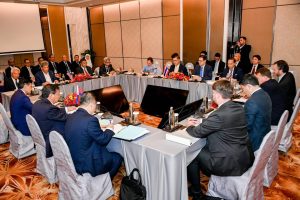Thailand has agreed to release the 18 Cambodian soldiers currently in its custody, Cambodia’s foreign minister said on Saturday, as the two sides seek to hash out a peace agreement ahead of next week’s Association of Southeast Asian Nations (ASEAN) summit.
Speaking to reporters after returning from Malaysia, where he took part in peace talks on Friday, Prak Sokhonn said that the agreement would include the release of the soldiers, part of a group of 20 who were captured by Thailand shortly after a ceasefire came into effect in late July. The ceasefire ended five days of fierce fighting between the two sides, which killed at least 43 people and displaced more than 300,000 on both sides of the border.
Sokhonn said that the agreement would outline “essential tasks we must accomplish to rebuild trust and normalcy between our nations.” These include “working together to restore diplomatic relations… and further cooperation to combat online scams, demining at the border areas and the withdrawal of weaponry from the border areas.” He also said that after the agreement is signed, Thailand will release “without delay” the 18 Cambodian soldiers in its custody.
According to the Malaysian government, U.S. President Donald Trump will visit Kuala Lumpur to preside over the signing of the peace agreement during the ASEAN Summit and related meetings, which run from October 26 to 28, although his attendance has not yet been confirmed by the White House. In any event, the exact terms of this “Kuala Lumpur Declaration” remain unclear, and officials from the two nations met in Kuala Lumpur on Friday along with officials from Malaysia and the United States in order to hash out the details of the agreement.
The release of the 18 Cambodian soldiers would seem to be a logical part of any peace agreement between Bangkok and Phnom Penh, and their detention has become a major sticking-point between the two sides since they agreed to a ceasefire on July 28.
Cambodia has repeatedly called for the soldiers’ release, arguing that their capture violated the letter and spirit of the ceasefire. While Thailand returned two injured soldiers on August 1, it continues to hold the remaining 18 as prisoners of war, saying that it will only release them upon a final settlement of the border conflict.
Remarks from Thai officials in recent days suggest that the release of the soldiers could be some way off. In a statement yesterday, the Royal Thai Army denied that the soldiers had already been released, and said it would only do so if Phnom Penh fulfills the four conditions that Thailand has previously stated as its demands: the withdrawal of troops from border positions, the joint removal of landmines, cooperation on the elimination of cyber scam operations targeting Thai residents, and – most contentiously – the resettlement of Cambodian citizens whom it claims have encroached into Thai territory.
“Cambodia must demonstrate sincerity and completely cease all acts of hostility towards Thailand before any further joint discussions can take place,” Thai military spokesperson Maj. Gen. Withai Laithomya said in the statement.
Foreign Minister Sihasak Phuangketkeow said yesterday that the release of the soldiers would likely be a part of the Kuala Lumpur Declaration, but that Cambodia would have to fulfill certain conditions before Thailand would consider releasing them.
“Once those steps are carried out, the release of prisoners will be part of that process,” Sihasak said, as per The Nation. He said that that Thailand was seeking clear action plans and verifiable steps from the Cambodian side. “We want to go further than just agreeing in principle – we need confidence that both sides will implement what’s agreed,” he said.
Otherwise, Sihasak said that during “sincere and constructive” talks on Friday, the two governments had reached an agreement on mutual troop withdrawals and mine clearance, which will be discussed in more detail at the upcoming Thai-Cambodian General Border Committee meeting, which opens today.
The Thai comments reflect the state of tension and mistrust that still exists between the two nations. As I noted last week, the looming Trump-imposed deadline for reaching a new peace agreement has given the two sides limited time to resolve the most pressing issues along their disputed border. Moreover, the mobilization of nationalist sentiments in both nations has imposed limits on what they can agree at the negotiating table.
In Cambodia, for instance, there has been considerable social media agitation about the possibility that the upcoming agreement might lead Cambodia to lose territory. This forced Prime Minister Hun Manet to release a statement yesterday clarifying that there agreement would not involve questions of territory. He said that it would instead be about “preparing conditions and codes of conduct for creating and ensuring a favorable environment to end the conflict and restore relations between the two countries,” he said.
In other words, the upcoming agreement will not involve any fundamental resolution of the border dispute, which has its roots in a treaty signed between French Indochina and the Kingdom of Siam in 1907, and has erupted periodically since the middle of last century. A comprehensive solution would almost certainly require the two sides to agree to an independent demarcation of the border, compromises on territorial claims, and possible exchanges of territory.
As things stand, the Kuala Lumpur Declaration may succeed in nudging the two sides toward a resumption of normal diplomatic relations and economic intercourse, but it is unlikely to mark much more than the first of many steps toward a lasting peace. Whether such a incremental, albeit necessary, agreement requires the presence of the U.S. president is another question entirely.





























